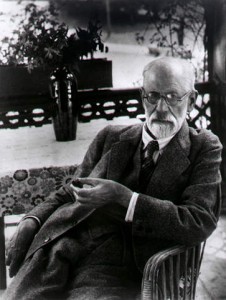- Sigismund (later changed to Sigmund) Freud
- Freud was an Austrian neurologist and the founder of psychoanalysis, who created an entirely new approach to the understanding of the
 human personality. He is regarded as one of the most influential – and controversial – minds of the 20th century.
human personality. He is regarded as one of the most influential – and controversial – minds of the 20th century.
- Sigmund Freud was born on May 6, 1856
- Freud’s childhood home in Freiberg (Freud Museum London)
- Freud was born in a rented room over a blacksmith’s shop in Freiberg, Moravia, a small town in what is now a part of the Czech Republic. He traced his sense of confidence and destiny to his first years growing up in the simple provincial town.
Freud’s Father
- Bankrupt, Jakob Freud (1815 – 1896) took his family to Vienna where they lived in what had once been the Jewish ghetto.
- Jacob never found a full-time job again. Until the day he died, he would depend on the generosity of relatives.
- “Freud’s father was a very dubious man. Nobody knows exactly how he made a living. He was a kind of dreamer.” -Martin Bergmann
Freud’s Mother
- Young Freud became the focus of his mother, Amalie’s (1835 – 1930) most extravagant hopes. A brilliant student, he finished at the top of his class. Five sisters and a brother were born by the time he was ten, but in a growing family constellation, the first-born son remained the brightest star.
- “He was close to her, she was certainly close to him. She was very strong. We know from comments by other relatives that she was domineering and dictatorial. I think he was a little afraid of her.”- Peter Gay
Freud’s Wife
- Martha Bernays 1891 – 1951
- Twenty-one year old Martha Bernays was peeling an apple when Freud first saw her. Soon, he was sending her roses everyday and calling her “Princess.” Within two months, they were engaged. Four yrs later, they married and had six children.
- Freud earned no money from his scientific work so he became a doctor to support his family.
- Freud’s Religion
- Freud’s first years were spent under the shadow of Catholicism. His parents were Jewish, but most of Freiburg’s 5000 citizens were Roman Catholic.
Freud’s Fame
- Freud was an avowed atheist. He didn’t accept Judaism as a religion yet fully identified and had the identity of a Jew.
- The Interpretation of Dreams was published in November, 1899. During the next 6 years, the book would sell only 351 copies. It would take two decades before Freud achieved the fame he had always imagined. But, later in life, he still viewed this book as his most important:
- “The Interpretation of Dreams contains… the most valuable of all the discoveries it has been my good fortune to make. Insight such as this falls to one’s lot but once in a lifetime.”
Nazism
- In 1933, the Nazis came to power and burned Freud and other author’s books.
- “What progress we are making,” Freud told a friend. “In the Middle Ages they would have burnt me; nowadays they are content with burning my books.” Five years later, Freud was forced to flee to England. His influential friends and family members bargained with the Nazis for his ransom.
Freud’s Death
- In 1923, Freud was diagnosed with cancer of the jaw a result of years of cigar smoking. He would have 30 operations over the next 16 years to treat the progressive disease. He died in London of mouth cancer on 23 September 1939.
- The Freudian slip (an error in speech, memory, or physical action that is believed to be caused by the unconscious mind) became a household term and came about when Freud described the phenomenon he called Fehlleistung, or faulty action, in German, but termed as parapraxis, or other action, in English. In his 1902 book The Psychopathology of Everyday Life, Freud gives several examples of seemingly trivial, bizarre or nonsensical Freudian slips.
Freud’s Theory of Personality
- Freud, a neurologist, was unable to find biological causes for his patients’ symptoms. He became convinced that many of the physical problems were psychological in origin.
- The mind is divided into 2 parts:
- the conscious mind (memories that can be recalled)
- b) the unconscious mind (memories that cannot be recalled)
- The unconscious mind has a profound influence on behaviour
- Treatment of psychiatric disorders by “unlocking” the unconscious through hypnosis
- Free association
- Dream interpretation
- Freud’s Theory of Mind
- The mind has three aspects, each of which influences the way we think, feel and act:
- id (completely unconscious) – pleasure-seeking element, contains all primitive parts of our personality (aggression, sexual drive), seeks to obtain immediate gratification
- ego (partially unconscious) – uses positive and thoughtful actions to obtain good results, controls and integrates behaviour, compromises between the pressures of the id, the counterpressures of the superego and the demands of reality (driven by the reality principle)
- superego (completely unconscious) – referees between the id and the ego, tells us what is right and what is wrong (the conscience), it urges us to strive for perfection (ego-ideal)
- Freud’s Conception of the Human Psyche
(The Iceberg Metaphor)
